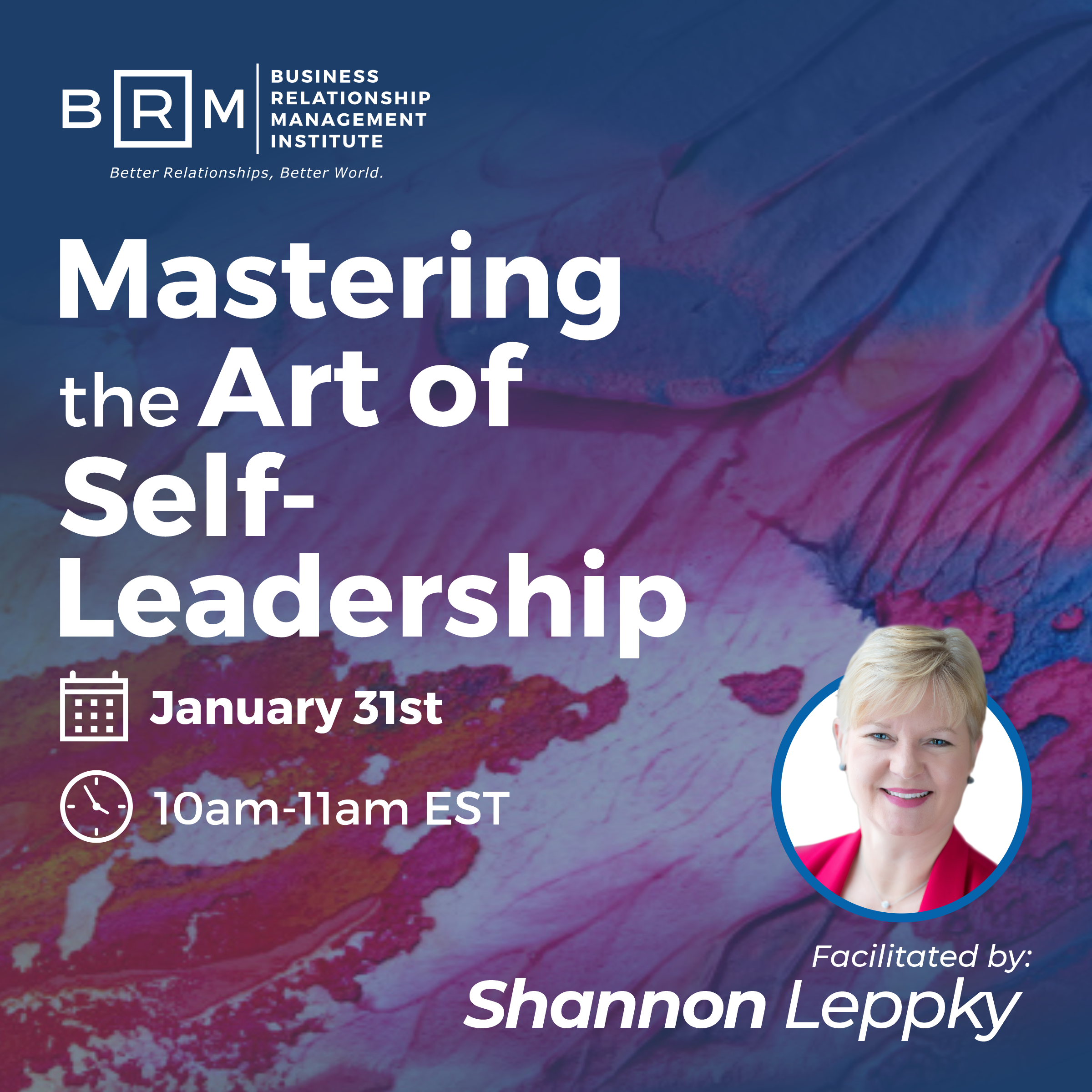Four Pillars of Self Leadership: A Guide for Those Who Influence Through Relationships

In the dynamic realm of professional interactions, the depth of our self-awareness shapes the trajectory of our relationships.
As a seasoned executive coach and team facilitator who has navigated the intricacies of the corporate landscape at a senior level, I have witnessed the transformative power of self-leadership and strive to practice it myself. I have learned that it requires courageous curiosity, intentional action, and grace.
In this blog post, we delve into four core aspects of self-leadership, a foundational skill for those in the challenging and critical role of business relationship management (BRM).
The Power of Self Awareness
The ability to be self-aware in these moments determines the outcome we achieve. As professionals, we often find ourselves juggling multiple responsibilities, focusing on the task at hand, oblivious to the thoughts and emotions we have in the moment.
The more often we engage in self awareness, the more attuned we become to our internal landscape, what we are thinking and how we are feeling. This heightened self-awareness enables us to navigate relationships with a clearer understanding of our motivations and responses, and why we experience the outcomes that we do.
As a BRM, the ability to assess and adapt one’s approach in real-time is invaluable. Greater awareness of what we are thinking and how we are feeling provides us with important data to help us with the delicate balance between assertiveness and adaptability. A critical skill that requires our constant attention.
You are in a crucial conversation with a colleague, client, or leader.
How tuned in are you to your thoughts and emotions?

The Art of Self Monitoring
How often do you take time to reflect on the actions that you took, the strengths you leveraged, and the impact you had?
Self-monitoring is akin to being the conductor of our own orchestra. It involves a keen awareness of not only what we are doing in the moment, but to reflect on our actions and their impact over time. It enables us to gauge the effectiveness of our interactions, identify areas for improvement, and adapt our strategies as needed.
It’s a continuous process of learning and refining our approach, ensuring that our actions resonate positively with others, and fit for the context in which we work. It requires courageous curiosity and the ability to be kind to ourselves, as none of us get it right all the time.
The Role of Self Discipline
How conscious are you of the behaviours that you choose to use?
In the fast-paced world of business relationship management, self-discipline emerges as a linchpin of self-leadership. When he introduced self leadership into the organizational literature in the 1980s, Charles Manz emphasized the significance of self-discipline in fostering the self-motivation and self-direction necessary for accomplishing desired outcomes.
Self-discipline is not just about resisting distractions; it’s a strategic effort to align actions with intentions. Knowing what we are trying to achieve and taking deliberate actions to achieve it. For a BRM, this means consistently making choices that are in alignment with the business strategy, are contextually appropriate for the organization and its ecosystem, and cultivating the required relationships needed to thrive.
Nurturing Self Appreciation
When was the last time you reflected on and celebrated your successes?
Amidst the hustle and bustle of professional life, taking a moment to recognize and appreciate ‘the wins’ is often neglected. In the landscape of business relationships, a BRM who values and appreciates their contributions is more likely to foster a culture of collaboration and shared success with others.
Self-appreciation is not about self-indulgence; it’s a practice rooted in acknowledging our achievements, both big and small. When we recognize and appreciate our own efforts, we can reinforce positive behaviors and cultivate a growth mindset. This enhances our confidence and well-being particularly when we experience challenges. It is a vital component of maintaining resilience and motivation in the face of challenges.
The Holistic Approach to Self Leadership
For anyone who desires to influence change and help organizations be great through relationships, mastering the elements of self leadership is as crucial as understanding methodologies, business intricacies, and the dynamics of interpersonal relationships. As we navigate the ever-evolving landscape of professional connections, let us not underestimate the transformative power of leading ourselves first. And to have the courage to do so.
If you’re interested in learning more about Self-Leadership, register to attend the Mastering the Art of Self Leadership Webinar happening on Wenesday January 31, 2024 as Shannon shares more around this incredibly relevant topic!
About the Author
Shannon’s journey from the C Suite to the Ranch has afforded her with the opportunity to use a harmonious blend of corporate strategic leadership and the profound yet often overlooked capacity to lead from the heart. In her unique approach, Shannon extends an invitation to those she partners with to join her in the Red Chair – a space characterized by courageous curiosity and trust. Here, the exploration transcends mere thoughts and delves into the realm of emotions, emphasizing the significance of leading authentically and empathically.

